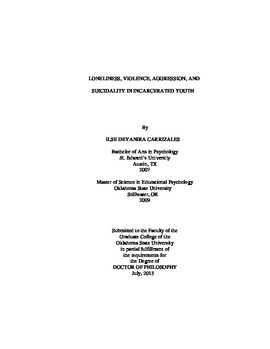| dc.contributor.advisor | Romans, John S. C. | |
| dc.contributor.author | Carrizales, Ilse Deyanira | |
| dc.date.accessioned | 2014-09-24T14:16:52Z | |
| dc.date.available | 2014-09-24T14:16:52Z | |
| dc.date.issued | 2013-07 | |
| dc.identifier.uri | https://hdl.handle.net/11244/11005 | |
| dc.description.abstract | Many adolescents are incarcerated for committing aggressive and violent acts yearly. Juvenile facilities are frequently at maximum capacity or are experiencing overcrowding, providing more opportunities for juveniles to be aggressive. While juvenile violence and aggression have had much attention in previous research, minimal research has been conducted with adjudicated juveniles detained in secure facilities. Suicidality is also increasing in both the general juvenile population and in the incarcerated juvenile population and there is a gap in the literature when looking at aggressive, violent and suicidal behaviors within a secure juvenile facility. This study investigated the effects of loneliness on the aggressive and violent behaviors expressed towards staff and peers as well as suicidal ideations and attempts from incarcerated juveniles in a secure juvenile facility. Further, the study investigated the relationship of protective factors such as involvement, strong social support, strong attachment and bonds, positive attitude towards intervention and authority, strong commitment to school, and resilient personality traits with loneliness, aggression, violence, and suicidality. | |
| dc.description.abstract | A total of 60 incarcerated juveniles volunteered to participate in this study. Results revealed juveniles who reported experiencing higher levels of aggression also reported having higher levels of loneliness and higher levels of suicidality. Participants who reported higher levels of loneliness also reported higher levels of suicidality. A significant relationship was not found with aggression and violence, nor with aggression and suicidality. Protective factors were not significant in regards to predicting suicidality and loneliness. Positive Attitude Towards Intervention and Authority was found to be a significant predictor of aggression. Those reporting having higher levels of protective factors (Prosocial Involvement, Strong Social Support, Strong Attachments and Bonds, Positive Attitude Towards Intervention and Authority, Strong Commitment to School, Resilient Personality Traits) reported lower levels of violence. Strong Social Support and Positive Attitude Towards Intervention and Authority were both significant predictors in predicting violence. | |
| dc.format | application/pdf | |
| dc.language | en_US | |
| dc.rights | Copyright is held by the author who has granted the Oklahoma State University Library the non-exclusive right to share this material in its institutional repository. Contact Digital Library Services at lib-dls@okstate.edu or 405-744-9161 for the permission policy on the use, reproduction or distribution of this material. | |
| dc.title | Loneliness, violence, aggression, and suicidality in incarcerated youth | |
| dc.contributor.committeeMember | Boswell, Donald L. | |
| dc.contributor.committeeMember | McGaha-Garnett, Valerie | |
| dc.contributor.committeeMember | Winterowd, Carrie | |
| dc.contributor.committeeMember | Mendez, Jesse Perez | |
| osu.filename | Carrizales_okstate_0664D_12919.pdf | |
| osu.accesstype | Open Access | |
| dc.type.genre | Dissertation | |
| dc.type.material | Text | |
| dc.subject.keywords | aggression | |
| dc.subject.keywords | incarcerated juveniles | |
| dc.subject.keywords | loneliness | |
| dc.subject.keywords | protective factors | |
| dc.subject.keywords | suicidality | |
| dc.subject.keywords | violence | |
| thesis.degree.discipline | Counseling Psychology | |
| thesis.degree.grantor | Oklahoma State University | |
